Beginning the conversation
"Never argue with an idiot - they drag you down to their level and then beat you with experience."
"The Initial Mystery that attends any journey is how did the traveler reach his starting point in the first place?
-Louis Bogan, Journey Around My Room
If we begin from a certain perspective, and vigorously hold to our interpretation of truth or worldview, we may limit the full potential of what we will discover in our pursuit of meaning. There are two major causes in
mis-communication and misunderstanding; ambiguity of language and biases. However, the most detrimental of all factors is pride and the outright desire to never admit fault or possessing an incomplete worldview.
"Never argue with an idiot - they drag you down to their level and then beat you with experience."
"The Initial Mystery that attends any journey is how did the traveler reach his starting point in the first place?
-Louis Bogan, Journey Around My Room
If we begin from a certain perspective, and vigorously hold to our interpretation of truth or worldview, we may limit the full potential of what we will discover in our pursuit of meaning. There are two major causes in
mis-communication and misunderstanding; ambiguity of language and biases. However, the most detrimental of all factors is pride and the outright desire to never admit fault or possessing an incomplete worldview.
As I began to embark on my own personal quest concerning the question of the meaning of life, I quickly realized the overwhelming nature of the pursuit. On the one hand there are so many books and blogs that heartily and without compromise cling to religious assumptions, asserting that their brand of truth is the final authority because of the claims of their founders and or Holy writings. Or that it is simply just 'the truth' because, well, it is the Truth as believed and experienced by the author.
They typically range, on the one hand, from the highly personal/mystical types of eastern religious - new age varieties to the purely theological-philosophical and even pseudo-scientific approaches that are becoming more common on the other. Over the past several decades there has been a growing industry of the modern theme and variations of Pop psychology "How to" and "Six steps to", "discovering your ......" etc. approaches that often mix several disciplines ranging from psychology to religion and rely heavily on the testimony and experiences of the author. They are usually filled from beginning to end with "I have discovered", "you just need to", and you will have purpose in life if you.....etc. Many of these books do not necessarily propose to deal directly with the 'meaning of life' question, they do however, by default, in offering a model to be pursued for the intent of leading a better more purposeful life, thus speaking to our need for Meaning.
It is not my goal in meaning tree to criticize these approaches. Often what they suggest can work for a time solving some immediate surface issues, the symptoms, that are characteristically the outgrowth of a deeper problem. I prefer to honestly and in an unbiased approach critique the various approaches determining what seems to add to this conversation and what may be of little help. I do this largely on the premise of a hierarchy of truth that is an outgrowth of the question of meaning and a the best way to build a model for purposeful living.
Many of the modern 'pop' or 'self-help' approaches generally treat the question of meaning as any other human endeavor, to be exclusively studied, analyzed and understood according to the rules of reason or in a historical context. Though I share the merits of many of these methods it is somewhat inadequate for addressing the full range of human experience and beliefs concerning the pursuit of meaning. In other words we all share some things in common in our human experience, but, we all have to answer for our beliefs and choices we make individually in our pursuit of happiness, purpose and meaning. Meditation, prayer and deep commitment to a religious institution works for some but not others. For some the pursuit of very attainable/measurable goals with very pragmatic results is of a higher value. Others see the pursuit of purposeful living and meaning as being a intellectual struggle a long and arduous quest that guarantees little.
When we consider the deeply personal question of meaning, what seems so obvious and simple to some may very well make little sense to another.
The question for many is who or which approach should we put our confidence. How in the world do we navigate through the confusion of choices that we are surrounded with? Who or what institution or worldview do put our confidence?
There has been little success in figuring out what the real problem of meaninglessness is, and much of our efforts for a prescriptive solution, in the modern struggle of life, is at best treating symptoms. Unless we identify certain fundamental problems and take into consideration some facts we may not be comfortable with, starting the conversation will likely have certain limitations. Let's seek to acknowledge those problems and limitations and lay down some premises from which to begin our dialog.
They typically range, on the one hand, from the highly personal/mystical types of eastern religious - new age varieties to the purely theological-philosophical and even pseudo-scientific approaches that are becoming more common on the other. Over the past several decades there has been a growing industry of the modern theme and variations of Pop psychology "How to" and "Six steps to", "discovering your ......" etc. approaches that often mix several disciplines ranging from psychology to religion and rely heavily on the testimony and experiences of the author. They are usually filled from beginning to end with "I have discovered", "you just need to", and you will have purpose in life if you.....etc. Many of these books do not necessarily propose to deal directly with the 'meaning of life' question, they do however, by default, in offering a model to be pursued for the intent of leading a better more purposeful life, thus speaking to our need for Meaning.
It is not my goal in meaning tree to criticize these approaches. Often what they suggest can work for a time solving some immediate surface issues, the symptoms, that are characteristically the outgrowth of a deeper problem. I prefer to honestly and in an unbiased approach critique the various approaches determining what seems to add to this conversation and what may be of little help. I do this largely on the premise of a hierarchy of truth that is an outgrowth of the question of meaning and a the best way to build a model for purposeful living.
Many of the modern 'pop' or 'self-help' approaches generally treat the question of meaning as any other human endeavor, to be exclusively studied, analyzed and understood according to the rules of reason or in a historical context. Though I share the merits of many of these methods it is somewhat inadequate for addressing the full range of human experience and beliefs concerning the pursuit of meaning. In other words we all share some things in common in our human experience, but, we all have to answer for our beliefs and choices we make individually in our pursuit of happiness, purpose and meaning. Meditation, prayer and deep commitment to a religious institution works for some but not others. For some the pursuit of very attainable/measurable goals with very pragmatic results is of a higher value. Others see the pursuit of purposeful living and meaning as being a intellectual struggle a long and arduous quest that guarantees little.
When we consider the deeply personal question of meaning, what seems so obvious and simple to some may very well make little sense to another.
The question for many is who or which approach should we put our confidence. How in the world do we navigate through the confusion of choices that we are surrounded with? Who or what institution or worldview do put our confidence?
There has been little success in figuring out what the real problem of meaninglessness is, and much of our efforts for a prescriptive solution, in the modern struggle of life, is at best treating symptoms. Unless we identify certain fundamental problems and take into consideration some facts we may not be comfortable with, starting the conversation will likely have certain limitations. Let's seek to acknowledge those problems and limitations and lay down some premises from which to begin our dialog.
The following is a shortlist of some of the premises that will be helpful in beginning our discussion on the pursuit of meaning:
- The question of meaning is as equally emotional (psychological) as it is philosophical
- "A good question is better than a thousand answers".
- "All truth is God's truth."
- Words are deeply problematic, language ambiguous and interpretation unavoidable.
- A good debate is about the truth, engaging sound thinking and inspiring the heart to better living.
Premise # 1
The question of meaning is as equally emotional (psychological) as it is philosophical
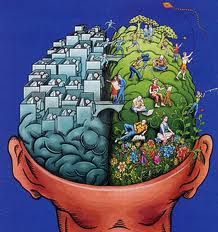
oregonbookoffaith
For some the question may have a stronger psychological or emotional dimension than what a philosophical or self-help approach can adequately address. Not to mention cultural, socio-economic and gender present in the communication of values and notions that must be considered in the quest for meaning. Meaning like the subject of love probably can not be completely or adequately defined in intellectual or academic terms. It also requires, but is not limited to an emotional context as well. Some of us will undoubtedly, place greater emphasis on what our instincts tell us while others will not make an emotional commitment to a belief or belief system until we have enough of the 'facts'. This is O.K. It is part of how we are all unique. No two people approach the question of meaning in exactly the same way.
In the last several decades there has been substantial advances made in our understanding of how the brain works. we now know that it is divided in two major regions the left and right hemisphere which is divided by the corpus callosum. A thin sheet of densely packed cells. Each side of the brain has its own responsibilities in responding to the perceptions and demands we place on it such as the functioning of the senses, memory, abstract thinking, language, mathematics, fight or flight in some even a belief in god. (see Split brain with one half atheist one half theist-V.S. Ramachandran, U-Tube). So we all have a certain propensity, a deep seated instinctual drive to be attracted to certain truths, paradigms for living and belief systems, (institutionalized or not) that may satisfy the fabric of our own particular consciousness and personalities. And we have only just begun! Add to this the list of social-cultural, educational, economic factors and the powerful influence our families have and had on our development. Each individual also has their own personal history which may include disappointment betrayal, success, failure, victimization, victory or just a life of outright mediocrity.
Finally, and what I believe to be almost entirely absent from the subject of the pursuit of meaning, and in modern literature in particular, is the issue of gender, how men and women inherently relate to their worlds according to what is often dramatically different perspectives.
It becomes clear that depending on the individual how the question of meaning or purpose in life is answered or even approached can vary greatly from person to person.
In the last several decades there has been substantial advances made in our understanding of how the brain works. we now know that it is divided in two major regions the left and right hemisphere which is divided by the corpus callosum. A thin sheet of densely packed cells. Each side of the brain has its own responsibilities in responding to the perceptions and demands we place on it such as the functioning of the senses, memory, abstract thinking, language, mathematics, fight or flight in some even a belief in god. (see Split brain with one half atheist one half theist-V.S. Ramachandran, U-Tube). So we all have a certain propensity, a deep seated instinctual drive to be attracted to certain truths, paradigms for living and belief systems, (institutionalized or not) that may satisfy the fabric of our own particular consciousness and personalities. And we have only just begun! Add to this the list of social-cultural, educational, economic factors and the powerful influence our families have and had on our development. Each individual also has their own personal history which may include disappointment betrayal, success, failure, victimization, victory or just a life of outright mediocrity.
Finally, and what I believe to be almost entirely absent from the subject of the pursuit of meaning, and in modern literature in particular, is the issue of gender, how men and women inherently relate to their worlds according to what is often dramatically different perspectives.
It becomes clear that depending on the individual how the question of meaning or purpose in life is answered or even approached can vary greatly from person to person.
Premise #2
"A good question is better than a thousand answers".
famous Rabbinical saying
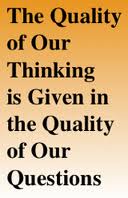
derry.k12.nh.us
“Wielded with purpose and care, a question can become a sophisticated and potent tool to expand minds, inspire new ideas, and give us surprising power at moments when we might not believe we have any”
rightquestion.org
"Pablo Picasso offered a modern formulation of ancient thought and about the importance of focusing on questions when complained, "Computers are useless; they can only give you answers."
The Spirituality of Imperfection Ernst Kurtz & Katherine Ketcham p-13-14
I remember taking philosophy in college. It was really fun in the beginning but towards the end of the semester I felt a little worn out by the burdensome process of trying to prove everything through continuous argumentation. After several months I left the class understanding that good thinking is systematic, rational and willing to seek out weaknesses in any argument, position or belief. Years later as a NYC police officer I would come to understand the fundamental difference between mere suspicion, reasonable suspicion and probable cause and the role varying level of evidence has in effecting an arrest. In law class and in trial testimony I witnessed real life application of how a good trial lawyer could produce doubt in the mind of a jury through repetitious questioning. When a police officer has probable cause to make an arrest, there may be a possibility that the individual is innocent, but the officer does have enough evidence to take action. On trial an individual may be convicted, the jury believing beyond a reasonable doubt that the person is guilty. However, in unusual cases there is always some possibility that the they are innocent. I think we can safely say that many more accuse go free though they did in fact commit the crime. A good trial lawyer will raise an excessive amount of questions in order to create contradiction, discord and confusion in testimonies. Good prosecutors will stick to the fundamentals of the 'facts' and build enough evidence that is coherent and consistent. Our criminal justice system acts yet many questions remain but we have much to learn from this approach. After all the most important treasure in life is at stake. Our deepest sense of purpose. What I am proposing here is that in our pursuit of meaning there may always exist some question or even doubt but we can and should act on a model of meaning that is at the very least coherent and has clarity through a structured system of evidence.
The questions we raise will only sharpen our resolve and strengthen or transform our views.
I am suggesting that it is very beneficial to pose as many questions as is necessary and hopefully gain some insight through open, honest and inspired dialog. Ultimately what I believe may emerge is a model for how to approach a spiritual pursuit of meaning in a scientific & modern context. Rather than beginning and relying upon a specific religious/institutionalized belief system, sacred book or creeds, secular philosophy or scientific paradigm/world view it would be preferable to first begin our conversation with a question. This method, (which certainly borrows from the scientific method) is as much about evaluating how we approach the question and importance of meaning as it is about what a strong model for the pursuit of meaning might be. I can go to a myriad of web sights, blogs, U-Tube videos, or visit the book store and find books on how a particular religion, philosophy, meditation practice, plan for wealth accumulation, or the most recent entry atheistic scientism will provide a model for a life of meaning or purposeful living. However, no matter how true a particular approach or belief system seems, no matter convinced an individual or group believes something is true, how do we in fact know it is true? For the time being we have to accept our human 'lot' and the fact that we see in shadows. There is no one out there self proclaimed or otherwise that is all knowing. We need to be a little cynical, a little open minded, willing to admit our ignorance, willing to even dare I say be wrong and ask the best the most difficult questions. This is what good investigation is all about. It is what a good detective, great scientist and thinkers build their professional integrity on. I am in no way advocating a loosey-goosey type of approach or relativistic philosophy of life in which we never establish or build fundamental coherent truths into our life and thinking or questioning. Rather, a healthy balance and integration of perspectives will serve us in determining between truth and lies.
"Let the wise listen and add to their learning and let the discerning get guidance."
Proverbs 1:
rightquestion.org
"Pablo Picasso offered a modern formulation of ancient thought and about the importance of focusing on questions when complained, "Computers are useless; they can only give you answers."
The Spirituality of Imperfection Ernst Kurtz & Katherine Ketcham p-13-14
I remember taking philosophy in college. It was really fun in the beginning but towards the end of the semester I felt a little worn out by the burdensome process of trying to prove everything through continuous argumentation. After several months I left the class understanding that good thinking is systematic, rational and willing to seek out weaknesses in any argument, position or belief. Years later as a NYC police officer I would come to understand the fundamental difference between mere suspicion, reasonable suspicion and probable cause and the role varying level of evidence has in effecting an arrest. In law class and in trial testimony I witnessed real life application of how a good trial lawyer could produce doubt in the mind of a jury through repetitious questioning. When a police officer has probable cause to make an arrest, there may be a possibility that the individual is innocent, but the officer does have enough evidence to take action. On trial an individual may be convicted, the jury believing beyond a reasonable doubt that the person is guilty. However, in unusual cases there is always some possibility that the they are innocent. I think we can safely say that many more accuse go free though they did in fact commit the crime. A good trial lawyer will raise an excessive amount of questions in order to create contradiction, discord and confusion in testimonies. Good prosecutors will stick to the fundamentals of the 'facts' and build enough evidence that is coherent and consistent. Our criminal justice system acts yet many questions remain but we have much to learn from this approach. After all the most important treasure in life is at stake. Our deepest sense of purpose. What I am proposing here is that in our pursuit of meaning there may always exist some question or even doubt but we can and should act on a model of meaning that is at the very least coherent and has clarity through a structured system of evidence.
The questions we raise will only sharpen our resolve and strengthen or transform our views.
I am suggesting that it is very beneficial to pose as many questions as is necessary and hopefully gain some insight through open, honest and inspired dialog. Ultimately what I believe may emerge is a model for how to approach a spiritual pursuit of meaning in a scientific & modern context. Rather than beginning and relying upon a specific religious/institutionalized belief system, sacred book or creeds, secular philosophy or scientific paradigm/world view it would be preferable to first begin our conversation with a question. This method, (which certainly borrows from the scientific method) is as much about evaluating how we approach the question and importance of meaning as it is about what a strong model for the pursuit of meaning might be. I can go to a myriad of web sights, blogs, U-Tube videos, or visit the book store and find books on how a particular religion, philosophy, meditation practice, plan for wealth accumulation, or the most recent entry atheistic scientism will provide a model for a life of meaning or purposeful living. However, no matter how true a particular approach or belief system seems, no matter convinced an individual or group believes something is true, how do we in fact know it is true? For the time being we have to accept our human 'lot' and the fact that we see in shadows. There is no one out there self proclaimed or otherwise that is all knowing. We need to be a little cynical, a little open minded, willing to admit our ignorance, willing to even dare I say be wrong and ask the best the most difficult questions. This is what good investigation is all about. It is what a good detective, great scientist and thinkers build their professional integrity on. I am in no way advocating a loosey-goosey type of approach or relativistic philosophy of life in which we never establish or build fundamental coherent truths into our life and thinking or questioning. Rather, a healthy balance and integration of perspectives will serve us in determining between truth and lies.
"Let the wise listen and add to their learning and let the discerning get guidance."
Proverbs 1:
Questioning has the power to:
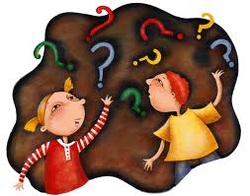
- Direct us in how to best approach our pursuit or investigation.of meaning and many other adventures in life.
- Reduce our dependence on mind-locked concepts, half-baked notions and reflexive- mediocre approaches to living.
- Make us less dependent on beliefs and perspectives that will not stand the test of time, scientific scrutiny.
- Help us be prepared for contingencies the many variations of the perilous trials of life.
- Make us better informed-sharper thinkers and give us credibility through the defense of coherent beliefs and convictions.
Premise #3
"All truth is God's truth."
Theology, philosophy, science and even much of our experiences and learning are all rooted in truth or not.
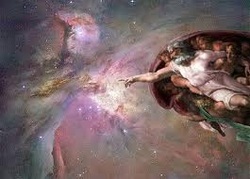
rantswithintheundeadgod.com
"Science without religion is lame, religion without science is blind."
Albert Einstein
“Wisdom calls aloud in the street,
she raises her voice in the public squares; at the head of the noisy streets she cries out, in the
gateways of the city she makes her speech”
Proverbs 1:20-21
A good friend of mine shared this five word saying with me several years ago and it was life changing. Why have I found such a simple expression so powerful? It made me aware of the fact that there is no monopoly on truth theological, scientific,mathematical, philosophical or otherwise. Rather, if we are religious, atheists, or believe in a type of god like Spinoza or Einstein held to, we should recognize that reality or creation has an undeniable coherence orderliness, fine-tuning or design. Perhaps, then we could cautiously step out in the assurance that 'Truth' is universal in its appeal and application and is not merely limited to the cultural or intellectual thinking of Western, Eastern, religious, secular - scientific, ancient or modern approaches. Hopefully, a discussion on how to pursue meaning capable of embracing science and spirituality will emerge in a coherent form. If you are a believer there is no such a thing as Truth from God and different types of truth! All Truth must come from God or your faith is inconsistent and riddled with contradiction. If you are a non-believer the existence of truth represents, even if it is without explanation, the closest representation to a principled and rational model for meaning. For the non-believer there is nothing better than truth.
So, it should be obvious that the best place to start is with an unbiased gathering of truth so that we have a coherent model that may continue to produce questions but gives us a practical foundation for the pursuit of meaning.
Additionally, It is my intent
that this approach may provide a foundation or framework for seeking and attaining a unique perspective in the modern context of world globalization, the prevailing spirit of hopelessness, the challenges of raising children, and reforming education in an age that is uncertain about morals, confused by religion, emotionally neutralized by science and distrustful of institutionalized authoritarianism. In other words, the aim of the discussion will be as practical as it is insightful. The best wisdom is the wisdom that inspires a life of good living that is intellectually coherent and emotionally satisfying!
Albert Einstein
“Wisdom calls aloud in the street,
she raises her voice in the public squares; at the head of the noisy streets she cries out, in the
gateways of the city she makes her speech”
Proverbs 1:20-21
A good friend of mine shared this five word saying with me several years ago and it was life changing. Why have I found such a simple expression so powerful? It made me aware of the fact that there is no monopoly on truth theological, scientific,mathematical, philosophical or otherwise. Rather, if we are religious, atheists, or believe in a type of god like Spinoza or Einstein held to, we should recognize that reality or creation has an undeniable coherence orderliness, fine-tuning or design. Perhaps, then we could cautiously step out in the assurance that 'Truth' is universal in its appeal and application and is not merely limited to the cultural or intellectual thinking of Western, Eastern, religious, secular - scientific, ancient or modern approaches. Hopefully, a discussion on how to pursue meaning capable of embracing science and spirituality will emerge in a coherent form. If you are a believer there is no such a thing as Truth from God and different types of truth! All Truth must come from God or your faith is inconsistent and riddled with contradiction. If you are a non-believer the existence of truth represents, even if it is without explanation, the closest representation to a principled and rational model for meaning. For the non-believer there is nothing better than truth.
So, it should be obvious that the best place to start is with an unbiased gathering of truth so that we have a coherent model that may continue to produce questions but gives us a practical foundation for the pursuit of meaning.
Additionally, It is my intent
that this approach may provide a foundation or framework for seeking and attaining a unique perspective in the modern context of world globalization, the prevailing spirit of hopelessness, the challenges of raising children, and reforming education in an age that is uncertain about morals, confused by religion, emotionally neutralized by science and distrustful of institutionalized authoritarianism. In other words, the aim of the discussion will be as practical as it is insightful. The best wisdom is the wisdom that inspires a life of good living that is intellectually coherent and emotionally satisfying!
All Truth:
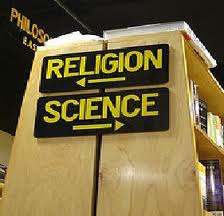
the-messiahs-blog.blogspot.com
- For the believer, truth originates with God and is therefore significant in an overall coherent perspective and understanding of reality.
- For the non-believer, truth is perhaps the greatest most dependable phenomenon for the acquisition of meaning.
- Is in no way biased or limited to any particular approach, belief system (religious or not).
Premise #4
Words are deeply problematic, language ambiguous and interpretation unavoidable.
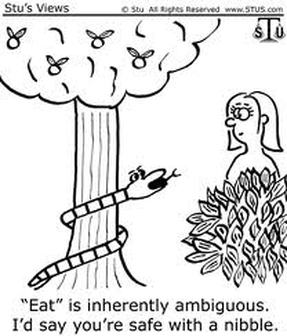
stus.com
"A police officer stops a woman and asks for her license. He reads it and says, "lady, it says here that you should be wearing glasses." the woman answers, "I have contacts." "I don't care who you know! says the officer. "Your getting a ticket!"
“Language is arguably the defining characteristic of the human species, yet the biological basis of our ability to speak, listen and comprehend remains largely mysterious; about its evolution, we know even less. As in other areas of cognition, comparative animal research can yield valuable insights but the study of the nature and origin of human language poses special challenges. No system of animal communication approaches human language in its complexity”
www.nature.com
I have a friend who loves to say; "words are cheap!" and I agree but with some exceptions such as; when the IRS notifies you with the words "we will garnish your paycheck" or the first time someone says "I love you" or when the surgeon emerges from the operating room and says "I'm sorry". The point is that for most of life there is a whole lot of talk and little of it is completely trustworthy or in the big picture of things, all that important. Which is why we have another saying "get it in writing" A whole lot of human confusion and even suffering comes as a result of the fact of the ambiguity of language of being misunderstood.
We should always be aware of the problem and hopefully be able to identify the actual definition of some terms which very often have different connotations to different people.Words like ‘spirituality’ or ‘meaning’ can have a different significance even for those who share relatively similar cultural backgrounds.With a little open mindedness and humility the problem of the ambiguity of language can be averted by understanding the power of words in as many contexts as possible.
Once we accept the premise that language is not static and dead but living, evolving and active our ability to integrate ancient wisdom into a modern context will be greatly enhanced.
Most of us also have a propensity to invoke words that we may feel are correct and irrefutable, simply because of their apparent association to a broader belief system or paradigm which is in our eyes undoubtedly correct. The preacher declaring, "thus saith the Lord" may be met with, 'amens' from the congregation and choir but will find that such a statement is met with little respect during intellectual debate at a secular university or in congress. Are the words of the preacher any less true because they do not speak with clarity in all social, intellectual & academic contexts? Is scientific discovery,observation and even theory of less value simply because it has little apparent relationship to the broad application of cultural attitudes toward science?
Additionally, wisdom and truth
should be as relevant to our individual pursuits as well as it is to the collective struggle. The principles that are capable of liberating us from lives foolishness to lives of meaning and purpose should likewise be capable of guiding our cultures to a promising future for our children as well as their children. This is a notion the framers of the American constitution seemed well aware of. It becomes clear in words such as inalienable and inherent.
The notion of the universality of wisdom goes back at least as long as three thousand years ago King Solomon wrote this concerning its secular role:
“Language is arguably the defining characteristic of the human species, yet the biological basis of our ability to speak, listen and comprehend remains largely mysterious; about its evolution, we know even less. As in other areas of cognition, comparative animal research can yield valuable insights but the study of the nature and origin of human language poses special challenges. No system of animal communication approaches human language in its complexity”
www.nature.com
I have a friend who loves to say; "words are cheap!" and I agree but with some exceptions such as; when the IRS notifies you with the words "we will garnish your paycheck" or the first time someone says "I love you" or when the surgeon emerges from the operating room and says "I'm sorry". The point is that for most of life there is a whole lot of talk and little of it is completely trustworthy or in the big picture of things, all that important. Which is why we have another saying "get it in writing" A whole lot of human confusion and even suffering comes as a result of the fact of the ambiguity of language of being misunderstood.
We should always be aware of the problem and hopefully be able to identify the actual definition of some terms which very often have different connotations to different people.Words like ‘spirituality’ or ‘meaning’ can have a different significance even for those who share relatively similar cultural backgrounds.With a little open mindedness and humility the problem of the ambiguity of language can be averted by understanding the power of words in as many contexts as possible.
Once we accept the premise that language is not static and dead but living, evolving and active our ability to integrate ancient wisdom into a modern context will be greatly enhanced.
Most of us also have a propensity to invoke words that we may feel are correct and irrefutable, simply because of their apparent association to a broader belief system or paradigm which is in our eyes undoubtedly correct. The preacher declaring, "thus saith the Lord" may be met with, 'amens' from the congregation and choir but will find that such a statement is met with little respect during intellectual debate at a secular university or in congress. Are the words of the preacher any less true because they do not speak with clarity in all social, intellectual & academic contexts? Is scientific discovery,observation and even theory of less value simply because it has little apparent relationship to the broad application of cultural attitudes toward science?
Additionally, wisdom and truth
should be as relevant to our individual pursuits as well as it is to the collective struggle. The principles that are capable of liberating us from lives foolishness to lives of meaning and purpose should likewise be capable of guiding our cultures to a promising future for our children as well as their children. This is a notion the framers of the American constitution seemed well aware of. It becomes clear in words such as inalienable and inherent.
The notion of the universality of wisdom goes back at least as long as three thousand years ago King Solomon wrote this concerning its secular role:
In providing the foundation for dialog
on the importance of something like ‘truth’ or ‘meaning’ we should feel no restraint in seeking historical, psychological,
scientific, social, artistic or scriptural/spiritual principles in our definitions. Unfortunately, because of the western paradigm of education which relies on the compartmentalization and fragmentation of almost all areas of knowledge many insist on reverting to arguments and beliefs that are exclusively religious, scientific or philosophically secular in nature, an approach that was fine for generations past but will not suffice today and in particular will be of little help to future generations.
in times to come, the goal of civic leaders, teachers and parents
might be to synthesize as many approaches and perspectives as possible and provide a model for the pursuit of meaning that is not strongly dependent on isolated and incomplete secular, religious or scientific reasoning.
It is my hope that In developing or invoking the possible scientific description of various ‘spiritual’ truths we can move forward without feeling that ancient wisdom or our beliefs are in conflict with modern discovery and the clear nature of creation. What we are seeking is the most inclusive description of creation and reality and our role in its design.
as to create a coherent pursuit of meaning possible?
Our goal should be to identify the model that may help build a safer world for our children to live in and improve their chances of leading truly meaningful lives. In my humble opinion the best place to start is by establishing a foundation for an open dialog inclusive of scientific discovery, theory and wisdom rooted in ancient wisdom resulting in a harmonious world view. What this implies is establishing certain 'core truths' that we can build on and build on that foundation in a way that coherent and philosophically sound!
Lets consider three words important to this dialog: meaning, spirituality and science
If we were to say my life has purpose what we are probably implying is we have a good idea of what we are doing and why we are doing it! However, if we ask what is the meaning of life there is a problem of coming to a definition of meaning. The word 'meaning' in this context may imply different things to different people. For many the word 'meaning' conjures ideas of spirituality, truth, relationship to self, creation and humanity while in modern western thinking it is nearly impossible to not be influenced or try integrate some science or reason into our perception of reality.
So now we are confronted with yet another term that is deeply problematic, spirituality. The word spiritual implies different things to different people depending on culture, religious background or lack of it, education, age, gender and even economic status. Today depending on who you ask spirituality might be; a complete illusion or hoax, a mere after fact of misguided brain chemistry, a unique but alien reality to the natural human condition, or the only actual reality that the physical arises out of (as in Buddhism) So, according to consensus spiritual or spirituality implies many different things to different people.
Scientific inquiry begins with observation of the symmetries and laws of nature, while spirituality embraces the belief that at the core of reality is a design originating or transcendent of nature. Those who embrace this model of spirituality see humans, in some degree, possessing a little of that transcendence in the form of consciousness, spirit, or soul.
For many the obvious and significant difference between science and spirituality is the simple acknowledgment that creation originates with a higher intelligence or does not. Unfortunately, many believe that science is not compatible with spirituality or that scientist do not believe in transcendence and all religious people think science to be a threat to religion. However, there are significant amount of scientist who are believers and high ranking clergy who find science an integral part of their faith.
There are some who have spent much time thinking these issues over and have come to the conclusion that truth is truth regardless of which human endeavor it arises out of, or from where or who discovered it.
on the importance of something like ‘truth’ or ‘meaning’ we should feel no restraint in seeking historical, psychological,
scientific, social, artistic or scriptural/spiritual principles in our definitions. Unfortunately, because of the western paradigm of education which relies on the compartmentalization and fragmentation of almost all areas of knowledge many insist on reverting to arguments and beliefs that are exclusively religious, scientific or philosophically secular in nature, an approach that was fine for generations past but will not suffice today and in particular will be of little help to future generations.
in times to come, the goal of civic leaders, teachers and parents
might be to synthesize as many approaches and perspectives as possible and provide a model for the pursuit of meaning that is not strongly dependent on isolated and incomplete secular, religious or scientific reasoning.
It is my hope that In developing or invoking the possible scientific description of various ‘spiritual’ truths we can move forward without feeling that ancient wisdom or our beliefs are in conflict with modern discovery and the clear nature of creation. What we are seeking is the most inclusive description of creation and reality and our role in its design.
as to create a coherent pursuit of meaning possible?
Our goal should be to identify the model that may help build a safer world for our children to live in and improve their chances of leading truly meaningful lives. In my humble opinion the best place to start is by establishing a foundation for an open dialog inclusive of scientific discovery, theory and wisdom rooted in ancient wisdom resulting in a harmonious world view. What this implies is establishing certain 'core truths' that we can build on and build on that foundation in a way that coherent and philosophically sound!
Lets consider three words important to this dialog: meaning, spirituality and science
If we were to say my life has purpose what we are probably implying is we have a good idea of what we are doing and why we are doing it! However, if we ask what is the meaning of life there is a problem of coming to a definition of meaning. The word 'meaning' in this context may imply different things to different people. For many the word 'meaning' conjures ideas of spirituality, truth, relationship to self, creation and humanity while in modern western thinking it is nearly impossible to not be influenced or try integrate some science or reason into our perception of reality.
So now we are confronted with yet another term that is deeply problematic, spirituality. The word spiritual implies different things to different people depending on culture, religious background or lack of it, education, age, gender and even economic status. Today depending on who you ask spirituality might be; a complete illusion or hoax, a mere after fact of misguided brain chemistry, a unique but alien reality to the natural human condition, or the only actual reality that the physical arises out of (as in Buddhism) So, according to consensus spiritual or spirituality implies many different things to different people.
Scientific inquiry begins with observation of the symmetries and laws of nature, while spirituality embraces the belief that at the core of reality is a design originating or transcendent of nature. Those who embrace this model of spirituality see humans, in some degree, possessing a little of that transcendence in the form of consciousness, spirit, or soul.
For many the obvious and significant difference between science and spirituality is the simple acknowledgment that creation originates with a higher intelligence or does not. Unfortunately, many believe that science is not compatible with spirituality or that scientist do not believe in transcendence and all religious people think science to be a threat to religion. However, there are significant amount of scientist who are believers and high ranking clergy who find science an integral part of their faith.
There are some who have spent much time thinking these issues over and have come to the conclusion that truth is truth regardless of which human endeavor it arises out of, or from where or who discovered it.
Premise #5 A good debate is about the truth, engaging sound thinking and inspiring the heart to better living.
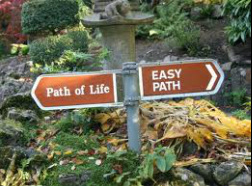
reellifewisdom.com
I have had occasion when your in the midst of what you believe to be dialog concerning an interesting topic and in short time you suddenly find yourself in this kind of exchange of words in which it becomes obvious that what is taking place is philosophical sparring for its own sake rather than enlightenment. Our world is very much in need of intellectually, unbiased and informed thinkers. However, we always need to balance the role the intellectual depths of knowledge and the practical wisdom of a desire to live out the gift of our learning.
Lets be honest, Most of us who enjoy a religious description of truth are less likely to introduce such a question into the debate as: "how could a loving God allow so much pain, suffering, death and injustice or if, 'Truth' and creation is so coherent why are there so many different religions and perspectives of god(s)?"
Likewise, the atheist is also likely to avoid or omit the compelling scientific question: "how is it that a cosmos that had an "in the beginning" (the Big bang model) which seems so finely tuned for the eventual existence of human life and consciousness" without a design or designer? People loyal to religious institutions, political entities/parties even sports teams will generally speaking avoid discussion of a scandal or even an obvious systemic failure in its leadership or members.
I believe the problem here is much more than merely wanting to be right or possessing the perfect infallible world view. I think that there is some sense we all have that our identity should be with our personal sense of meaning not the organizations or institutions we identify with.
Meaning like a tree - best understood and appreciated when looked at from all angles and up closely in unique detail. Every tree is unique, and possess its own symmetry which grows out of its story, its history. A history of how it responded to its environment and seasonal challenges as well as catastrophic environmental change.
Target points

- The question of meaning is as equally emotional (psychological) as it is philosophical & how the question of meaning or purpose in life is answered or even approached can vary greatly from person to person.
- "A good question is better than a thousand answers".
- "All truth is God's truth." (When it comes to understanding meaning there is no monopoly on truth)Theology, philosophy, science and even much of our human experiences are all rooted in truth.
- Words are deeply problematic, language is ambiguous and interpretation unavoidable.
- A good debate is about the truth, engaging sound thinking and inspiring the heart to better living.